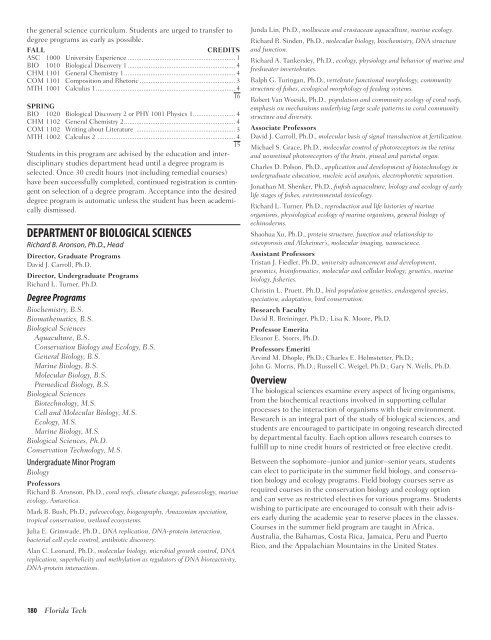2012–2013 UNIVERSITY CATALOG - Florida Institute of Technology
2012–2013 UNIVERSITY CATALOG - Florida Institute of Technology
2012–2013 UNIVERSITY CATALOG - Florida Institute of Technology
Create successful ePaper yourself
Turn your PDF publications into a flip-book with our unique Google optimized e-Paper software.
the general science curriculum. Students are urged to transfer to<br />
degree programs as early as possible.<br />
FALL CREDITS<br />
ASC 1000 University Experience ............................................................. 1<br />
BIO 1010 Biological Discovery 1 ............................................................. 4<br />
CHM 1101 General Chemistry 1 ............................................................... 4<br />
COM 1101 Composition and Rhetoric ...................................................... 3<br />
MTH 1001 Calculus 1 ............................................................................... 4<br />
16<br />
SPRING<br />
BIO 1020 Biological Discovery 2 or PHY 1001 Physics 1 ........................ 4<br />
CHM 1102 General Chemistry 2 ............................................................... 4<br />
COM 1102 Writing about Literature ........................................................ 3<br />
MTH 1002 Calculus 2 .............................................................................. 4<br />
15<br />
Students in this program are advised by the education and interdisciplinary<br />
studies department head until a degree program is<br />
selected. Once 30 credit hours (not including remedial courses)<br />
have been successfully completed, continued registration is contingent<br />
on selection <strong>of</strong> a degree program. Acceptance into the desired<br />
degree program is automatic unless the student has been academically<br />
dismissed.<br />
DePARTMenT OF BiOLOGiCAL SCienCeS<br />
Richard B. Aronson, Ph.D., Head<br />
Director, Graduate Programs<br />
David J. Carroll, Ph.D.<br />
Director, Undergraduate Programs<br />
Richard L. Turner, Ph.D.<br />
Degree Programs<br />
Biochemistry, B.S.<br />
Biomathematics, B.S.<br />
Biological Sciences<br />
Aquaculture, B.S.<br />
Conservation Biology and Ecology, B.S.<br />
General Biology, B.S.<br />
Marine Biology, B.S.<br />
Molecular Biology, B.S.<br />
Premedical Biology, B.S.<br />
Biological Sciences<br />
Biotechnology, M.S.<br />
Cell and Molecular Biology, M.S.<br />
Ecology, M.S.<br />
Marine Biology, M.S.<br />
Biological Sciences, Ph.D.<br />
Conservation <strong>Technology</strong>, M.S.<br />
Undergraduate Minor Program<br />
Biology<br />
Pr<strong>of</strong>essors<br />
Richard B. Aronson, Ph.D., coral reefs, climate change, paleoecology, marine<br />
ecology, Antarctica.<br />
Mark B. Bush, Ph.D., paleoecology, biogeography, Amazonian speciation,<br />
tropical conservation, wetland ecosystems.<br />
Julia E. Grimwade, Ph.D., DNA replication, DNA-protein interaction,<br />
bacterial cell cycle control, antibiotic discovery.<br />
Alan C. Leonard, Ph.D., molecular biology, microbial growth control, DNA<br />
replication, superhelicity and methylation as regulators <strong>of</strong> DNA bioreactivity,<br />
DNA-protein interactions.<br />
180 <strong>Florida</strong> Tech<br />
Junda Lin, Ph.D., molluscan and crustacean aquaculture, marine ecology.<br />
Richard R. Sinden, Ph.D., molecular biology, biochemistry, DNA structure<br />
and function.<br />
Richard A. Tankersley, Ph.D., ecology, physiology and behavior <strong>of</strong> marine and<br />
freshwater invertebrates.<br />
Ralph G. Turingan, Ph.D., vertebrate functional morphology, community<br />
structure <strong>of</strong> fishes, ecological morphology <strong>of</strong> feeding systems.<br />
Robert Van Woesik, Ph.D., population and community ecology <strong>of</strong> coral reefs,<br />
emphasis on mechanisms underlying large scale patterns in coral community<br />
structure and diversity.<br />
Associate Pr<strong>of</strong>essors<br />
David J. Carroll, Ph.D., molecular basis <strong>of</strong> signal transduction at fertilization.<br />
Michael S. Grace, Ph.D., molecular control <strong>of</strong> photoreceptors in the retina<br />
and nonretinal photoreceptors <strong>of</strong> the brain, pineal and parietal organ.<br />
Charles D. Polson, Ph.D., application and development <strong>of</strong> biotechnology in<br />
undergraduate education, nucleic acid analysis, electrophoretic separation.<br />
Jonathan M. Shenker, Ph.D., finfish aquaculture, biology and ecology <strong>of</strong> early<br />
life stages <strong>of</strong> fishes, environmental toxicology.<br />
Richard L. Turner, Ph.D., reproduction and life histories <strong>of</strong> marine<br />
organisms, physiological ecology <strong>of</strong> marine organisms, general biology <strong>of</strong><br />
echinoderms.<br />
Shaohua Xu, Ph.D., protein structure, function and relationship to<br />
osteoporosis and Alzheimer’s, molecular imaging, nanoscience.<br />
Assistant Pr<strong>of</strong>essors<br />
Tristan J. Fiedler, Ph.D., university advancement and development,<br />
genomics, bioinformatics, molecular and cellular biology; genetics, marine<br />
biology, fisheries.<br />
Christin L. Pruett, Ph.D., bird population genetics, endangered species,<br />
speciation, adaptation, bird conservation.<br />
Research Faculty<br />
David R. Breininger, Ph.D.; Lisa K. Moore, Ph.D.<br />
Pr<strong>of</strong>essor Emerita<br />
Eleanor E. Storrs, Ph.D.<br />
Pr<strong>of</strong>essors Emeriti<br />
Arvind M. Dhople, Ph.D.; Charles E. Helmstetter, Ph.D.;<br />
John G. Morris, Ph.D.; Russell C. Weigel, Ph.D.; Gary N. Wells, Ph.D.<br />
Overview<br />
The biological sciences examine every aspect <strong>of</strong> living organisms,<br />
from the biochemical reactions involved in supporting cellular<br />
processes to the interaction <strong>of</strong> organisms with their environment.<br />
Research is an integral part <strong>of</strong> the study <strong>of</strong> biological sciences, and<br />
students are encouraged to participate in ongoing research directed<br />
by departmental faculty. Each option allows research courses to<br />
fulfill up to nine credit hours <strong>of</strong> restricted or free elective credit.<br />
Between the sophomore–junior and junior–senior years, students<br />
can elect to participate in the summer field biology, and conservation<br />
biology and ecology programs. Field biology courses serve as<br />
required courses in the conservation biology and ecology option<br />
and can serve as restricted electives for various programs. Students<br />
wishing to participate are encouraged to consult with their advisers<br />
early during the academic year to reserve places in the classes.<br />
Courses in the summer field program are taught in Africa,<br />
Australia, the Bahamas, Costa Rica, Jamaica, Peru and Puerto<br />
Rico, and the Appalachian Mountains in the United States.

















